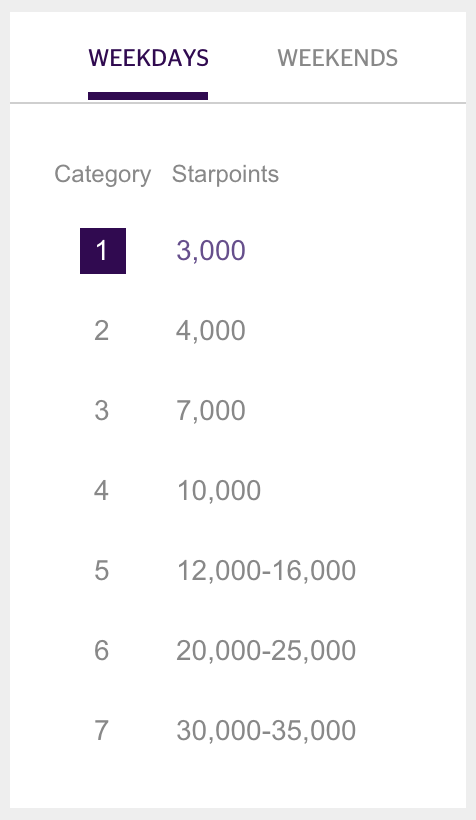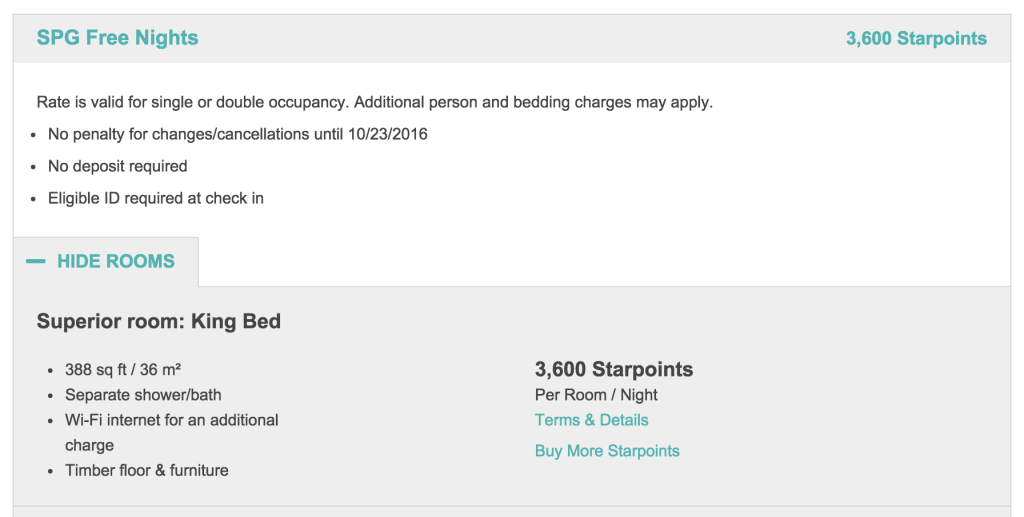This is the last in a series of posts on how to save money on hotel bookings by purchasing rewards points. For a more detailed explanation and walk-through of the theory, see the first post on Hyatt hotels.
Today we will be looking at the last major hotel rewards program, Starwood Preferred Guest (SPG), which will hopefully remain in tact through the end of 2016 but may not be long for this world due to the merger finalized earlier this year.
Admittedly, I’ve omitted chains like Club Carlson, Wyndham Rewards, and Choice Privileges, but Club Carlson doesn’t even pretend their own points are valuable, Wyndham has a fairly small footprint and only one rewards tier, and Choice hotels are generally inexpensive to begin with I’ve been asked to do a writeup on Choice Hotels, so be on the lookout.
The main event.
SPG is one of the favorite programs among travel hackers because of it’s 1:1 transfer ratio to over 30 airline mileage programs, but we’re going to only focus on the hotel side of things and see if there are any savings to be had by buying points and redeeming for free nights or as part of cash and points bookings.
The SPG award chart is divided into seven levels, with the top three further divided into high and low season awards (similarly to Hilton), and the lowest two level hotels have different rates for weekends versus weekdays. (Note that the ‘high’ and ‘low’ designations have nothing actually to do with the time of year and are simply a mechanism to tie redemption rates to cash prices). Here is the chart:
SPG offers you the ability to purchase points in 500 point increments, up to 20,000 per year, for a whopping 3.5 cents per point. This seems egregious, except that SPG has a fairly dense award chart (not that many points per property), which is probably an artifact of having 1:1 transfer ratios with airline miles. Logically, they have to charge more for a point than it would cost you to buy from the airline directly (somewhere around 3 cents per point), otherwise the airlines would lose a lot of money.
Getting back on topic, the points purchasing price induces the following prices for hotels in each category:
| Category | Points (low) | Points (high) | Total Cash (low) | Total Cash (high) |
| 1 | 2000 | 3000 | $70.00 | $105.00 |
| 2 | 3000 | 4000 | $105.00 | $140.00 |
| 3 | 7000 | $245.00 | ||
| 4 | 10000 | $350.00 | ||
| 5 | 12000 | 16000 | $420.00 | $560.00 |
| 6 | 20000 | 25000 | $700.00 | $875.00 |
| 7 | 30000 | 35000 | $1,050.00 | $1,225.00 |
I don’t know which is more depressing, this chart or Hilton’s. Probably this one. Yes, SPG properties tend to be fairly nice, but the prices balloon really quickly once you get past Category 3 because the points are so damn expensive. At least with Hilton you know that 95,000 points is going to cost a lot. The one saving grace is that SPG offers a fifth night free (like Marriott and Hilton), but you’re only going to be able to buy enough points to utilize the benefit at lower tier properties since it does not apply to cash and points bookings.
Here’s the cash and points chart alongside to the total cash costs:
| Category | Points | Co-pay | Total Cash |
| 1 | 1500 | $30.00 | $82.50 |
| 2 | 2000 | $35.00 | $105.00 |
| 3 | 3500 | $55.00 | $177.50 |
| 4 | 5000 | $75.00 | $250.00 |
| 5 | 6000 | $110.00 | $320.00 |
| 6 | 10000 | $180.00 | $530.00 |
| 7 | 15000 | $275.00 | $800.00 |
Still not great, but it’s a lot better. But is it good enough to yield some value?
Where can we find value?
Because of how expensive the points are, the greatest room for value is going to be towards the bottom of the chart where the points prices are extremely low. Travel is Free did a great summary of his favorite Category 1 and 2 Starwood properties, but of all the hotels he mentioned, the Le Meridien Angkor Wat caught my eye (since I’ll be taking a trip to Cambodia next fall). Let’s see how well we can do.
The paid rate for the Le Meridien is $120/night, but since it does not offer points and cash rooms (there wasn’t a single date on its calendar, in fact), we would have to buy enough points for an all-points redemption. Depending on the night (weekends are 3,000 points, weekdays are 4,000) purchasing points may or may not offer a savings (costing $105 for a weekend, $140 for a weekday).
What happens when we extend our stay to five days? Nothing, unfortunately. It took me a while to figure out why the fifth night free wasn’t triggering, but then I remembered that the fifth night free benefit only applies to Category 3-7 hotels. This is particularly bad because Category 1 and 2 hotels are the only ones for which you can actually buy enough points to pay for four nights (with the fifth free), so unlike Marriott, this extra value is out of reach.
Hopefully this was a good example of combining a couple of the techniques I’ve reviewed in the last few posts and how, if you’re willing to think outside the box (e.g. pay for the weekend nights with points, the rest with cash), you can save some money. It might not seem like much, but $20 here and there can add up. In fact, $20 is a better return than the points you’d get from a cash booking, and if you set it aside for a future trip, you could think of it as your very own ‘rewards program.’ Get creative.
Happy hacking.




[…] Starwood Preferred Guest […]